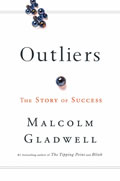In 1975, Bill Gates dropped out of Harvard University, created Microsoft and even tually became one of the world’s richest men. Did he succeed solely because of his brilliance? Consider: as an eighth grader in private school, Gates had access to a state-of-the-art computer with a time-sharing terminal – almost unheard of for an adolescent in 1968 – which allowed him to master programming.
In Outliers: The Story of Success (Little, Brown and Company) Malcolm Gladwell (BA 1984 Trinity) looks beyond individual traits of the wildly successful, and hones in on the importance of cultural legacies, parentage and serendipitous advantages. He explains why a surfeit of Canadian hockey stars are born near the start of the year; how Robert Oppenheimer became the Manhattan Project’s scientific director, despite trying to kill his university tutor; and why the Beatles became a great band. Gladwell’s theories leave the reader with a sense of disconcertment – it’s an ego-shattering notion, after all, to admit success requires being in the right place, at the right time.






